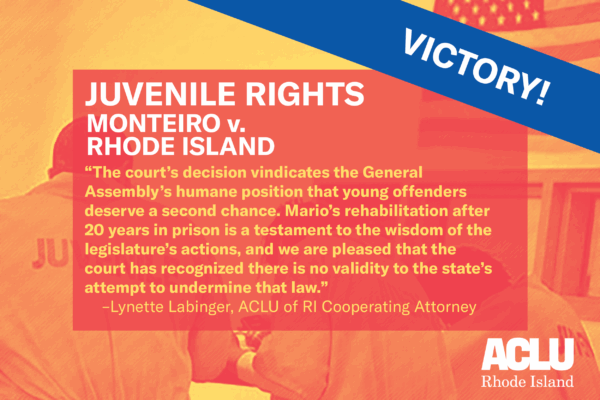In a victory for criminal justice reform and the rights of youthful offenders, Rhode Island Superior Court Judge Stephen P. Nugent today ruled that Mario Monteiro is eligible for parole. The ACLU of RI filed a court petition in February after the State took the position that the 2021 statute enacted by the General Assembly designed to give young offenders serving lengthy sentences a chance for early release on parole, which was overtly intended to help Monteiro, did not apply to him. Instead, the state had argued that Monteiro had to serve an additional 15 years in prison until parole eligibility.
The statute, often referred to as “Mario’s Law” based on Monteiro’s case, provides that “any person sentenced for any offense prior to his or her twenty-second birthday” is eligible for parole after serving 20 years. Monteiro is 39-years-old and has been incarcerated his entire adult life after being sentenced to two life sentences for a murder he committed when he was 17 years old. The law was passed in recognition of the fact that, as the U.S. Supreme Court has noted, “even when they commit terrible crimes,” juveniles lack the culpability of adults due to their immaturity and underdeveloped sense of responsibility and should therefore be given a second chance.
Despite the clear language of the statute, the Department of Corrections, the Attorney General and, by acquiescence, the Parole Board all took the position that the statute does not apply to people like Monteiro who are serving more than one sentence. Instead, they claimed that, despite already having served more than 20 years at the Adult Correctional Institution (ACI), he must serve at least an additional fifteen years on his second life sentence before he could be considered for parole. The ACLU noted that this position would “effectively operate to nullify” the statute’s terms “and defeat its purposes” since most people serving a life sentence were already eligible for parole after 20 years without the passage of Mario’s Law. Judge Nugent today agreed and rejected the state’s arguments.
The petition was handled by ACLU of Rhode Island cooperating Attorneys, Lynnette Labinger, Lisa Holley, and Sonja Deyoe. Attorney Labinger said today, “The court’s decision vindicates the General Assembly’s humane position that young offenders deserve a second chance. Mario’s rehabilitation after 20 years in prison is a testament to the wisdom of the legislature’s actions, and we are pleased that the court has recognized there is no validity to the state’s attempt to undermine that law.” Additional information about the case can be found here.


